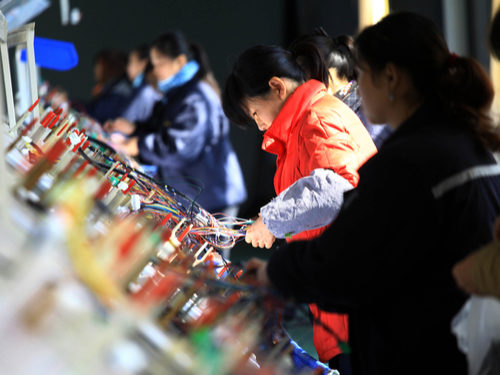
Think Tank
We Need Technology to Combat Labor Abuses in Supply Chains, New Study Finds

Factory audits alone are not sufficient to prevent labor abuses in global supply chains. Technology must also be applied to the problem.
That’s the conclusion of a recent report by Deloitte LLP’s Monitor Institute, a consulting team that works with private companies and other organizations to address social issues.
The report, “Responsible Supply Chain Tools: Understanding the Market Opportunity,” identifies a huge potential for technology tools that tackle the issue of ethical supply chains. It puts the market for such tools at between $889m and $2.7bn over the next five years.
Surveying approximately 25 private companies, consulting firms and non-profit service providers, the report focuses on four industries: apparel and footwear, food and beverage, hospitality, and information and communications technology. They were chosen based on their relatively high level of risk for forced labor or labor abuse.
Many companies have come to rely on audits as the primary method of ensuring contract manufacturers’ adherence to codes of ethical conduct. The problem is that such onsite visits yield only “point-in-time” data, according to Lisa Newman-Wise, manager at the Monitor Institute.
“Whether they’re announced or unannounced, they do not necessarily give an accurate picture,” she says. Deeper issues that don’t surface through audits include recruitment fees and sexual harassment or discrimination. Moreover, subsequent recommendations by inspectors often result in “Band-Aid solutions” that fail to get to the core of the problem.
Even tougher to uncover are unfair labor practices by second- and third-tier suppliers, of which brands and original equipment manufacturers have little or no visibility.
The speed of modern-day commerce, with suppliers and order profiles in constant flux, further contributes to the opacity of global supply chains at all levels, Newman-Wise says. The report cites a 2017 study conducted by the Economist Intelligence Unit, in which 49 percent of executives named supply-chain complexity as “the greatest hurdle to responsibility.”
Technology can help, according to companies interviewed by the report’s authors. They’re looking at a variety of tools that can address risk assessment, product traceability, ethical sourcing, ethnical recruitment and worker engagement. Some of the most promising versions can be implemented right at the factory, increasing the amount of data available to brands and OEMs.
A modern-day ethical sourcing tool can take the form of a collaborative platform, gathering data from multiple sources to provide buyers with a better understanding of where goods can be produced sustainably. Such solutions can also be used to monitor purchasing practices, labor rights, and ethical recruitment. Some of that information can come directly from workers on the factory floor, using mobile devices to submit feedback anonymously and in real time.
The report’s wide range of projected market value for such tools reflects their varied stages of development, Newman-Wise says. Yet some options with the greatest potential draw on existing technology, such as QR codes, big data and machine learning.
More advanced tools for risk assessment offer predictive capability, based on factors such as geography. The report identifies risk assessment and product traceability tools as those areas expected to see the highest rate of growth over the next five years.
At the same time, the report acknowledges potential obstacles to the broad acceptance of technology tools for ensuring ethical supply chains. Innovations must first overcome their “unknown and unproven” reputation, the authors say. They note skepticism by some interviewees of the ability of third-party tools to scale across diverse, multinational supply chains.
Furthermore, the report says, technology by itself can’t solve the problem. It must be accompanied by a concerted effort at change management. Companies must “gain buy-in and influence attitudes and behaviors, both at leadership levels and on the ground.” In addition, they should be working with foundations or NGOs to increase awareness of labor rights among other companies, workers, consumers, policymakers and investors.
As always, new technology comes at a cost. Newman-Wise says the report’s authors spoke primarily with large companies that possess the necessary resources for acquiring the tools. Still, there was an awareness among interviewees of the need to target investments where the greatest impact is likely to occur. The promise of the technology “needs to be made clear to stakeholders, so they understand [that] the investment of time and money is worth the cost,” the report says.
The proliferation of tools raises the risk of “pilot fatigue” among prospective adopters, the report acknowledges. Newman-Wise says it’s the responsibility of big companies “to test these tools and get them beyond the pilot stage, so that smaller companies can take them up.”
She says the report’s recommendations should be viewed as a first step toward identifying the ideal mix of technology, audits and business-process change that can eliminate labor abuses in global supply chains. The report calls for “bold action and collaboration from buyer companies, suppliers, national governments, local communities, investors and consumers.
“In the right hands, new socially responsible supply-chain tools can provide this network of actors with the additional data and solutions needed to help vulnerable workers,” the report concludes.






